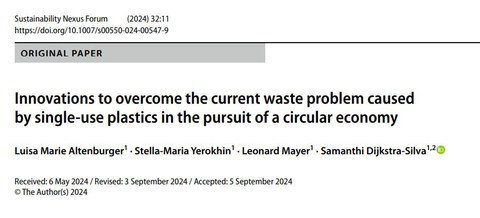11.12.2024
Neue Veröffentlichung: Innovations to overcome the current waste problem caused by single-use plastics in the pursuit of a circular economy
Ein aus dem Nexus-Seminar (Multidisciplinary Perspectives on Sustainability) entstandenes und mit drei Studierenden (L. M. Altenburger, S.-M. Yerokhin, L. Mayer) gemeinsam geschriebener Artikel wurde im Sustainability Nexus Forum veröffentlicht.
Wir freuen uns über dieses tolle Ergebnis, welches als PDF verfügbar zum Download ist: Innovations to overcome the current waste problem caused by single-use plastics in the pursuit of a circular economy
Zusammenfassung
Plastic production continues to increase each year, yet only 9% are successfully recycled. This has impacted natural habitats and ecosystems, due to an uncontrolled amount of waste. The food industry is a major contributor to plastic waste. To counter this problem, the demand for environmentally sustainable alternatives, i.e. bio-based plastics, in the pursuit of a circular economy is increasing. As such, this problem is interconnected and at the resource nexus of particularly, food, material, waste, and ecosystem. This systematic review provides an overview of diferent innovations regarding materials and additives for bio-based plastics for packaging in the food industry. The paper argues that a majority of materials for bio-based plastics originate from the food industry’s value chain and utilizing these resources is essential to reduce waste and to create more value, essentially addressing the problem with a focus on the resource nexus. Moreover, the importance of developing biodegradable and recyclable plastics to reduce the environmental impact of plastic waste is also highlighted, especially in the context of single-use food packaging. These fndings and conclusions cumulated into a framework to diferentiate the various materials and classify them regarding their biodegradability properties, origin (plant- or animal-based industry byproducts and raw materials) and end-of-life scenarios. This contributes to the academic literature and practice by categorizing diferent kinds of materials, which might be labelled environmentally sustainable, particularly biodegradable, but which might not always be the case and critically discussing implications of this.

